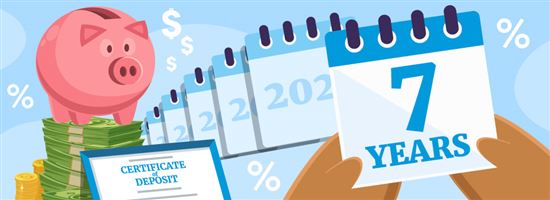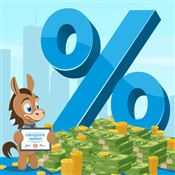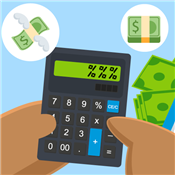7 Year CD Rates
Ad Disclosure: This article contains references to products from our partners. We may receive compensation if you apply or shop through links in our content. This compensation may impact how and where products appear on this site. You help support CreditDonkey by using our links.
Keep your money safe and earn a fixed rate with a 7-year CD. Check out who offers the best 7-year CD rates today.
 |
- KS StateBank:
7-Year CD - 3.85% APY - Apple Federal Credit Union:
84-Month CD - 3.81% APY - First Community Credit Union:
7-Year CD - 3.80% APY - Soarion Credit Union:
7-Year CD - 3.70% APY - BayPort Credit Union:
84-Month Special CD - 3.69% APY - FORUM Credit Union:
84-Month CD - 3.50% APY - Ent Credit Union:
84-Month CD - 3.39% APY - Gesa Credit Union:
84-Month CD - 3.35% APY - Redstone Federal Credit Union:
84-Month CD - 3.09% APY - Andrews Federal Credit Union:
84-Month CD - 3.00% APY
Protect your money for the long haul by considering 7-year CDs, which offer low risk and guaranteed returns. However, they can be hard to find and the APY might not be the best.
With that, let's look at the highest 7-year CD rates today and find out whether they're worth it or not.
7 Year CD - 3.40% APY
What is a 7-Year CD?
A 7-year CD is a savings account where you lock in a set amount of money for 7 years. It has a fixed interest rate, usually higher than a regular savings account.
One of the highest rates on a 7-year CD is .
How Do 7-Years CDs Work?
The way it works is, when you open a 7-year CD, you commit to keeping your money for the full term without early withdrawal. This restriction allows banks to provide higher APY compared to standard savings accounts.
While some think all long-term CDs have high rates, this isn't always the case due to how interest rates fluctuate. Most banks tend to be more conservative, offering lower APY.
Additionally, closing a 7-year CD early can incur significant penalties, often equivalent to a year's worth of interest.
Both long-term and short-term CDs have their advantages. If you are risk-averse and prefer to have a safe and stable means to grow your money, a long-term CD might be your choice. But if you want to take advantage of high rates and have more flexibility with your investment, a short-term CD is a better option.
How Much Does a 7-Year CD Pay?
Putting in $10,000 in a 7-year CD with a 3% APY could earn you around $2,299 once the CD matures.
To better illustrate how much you can earn, here's a table with various APY and deposit amounts:
| Rate | $6,500 | $10,000 | $25,000 |
|---|---|---|---|
| 0.50% | $6,731 | $10,355 | $25,888 |
| 1.00% | $6,969 | $10,721 | $26,803 |
| 1.50% | $7,214 | $11,098 | $27,746 |
| 2.00% | $7,466 | $11,487 | $28,717 |
| 2.50% | $7,726 | $11,887 | $29,717 |
| 3.00% | $7,994 | $12,299 | $30,747 |
| 3.50% | $8,270 | $12,723 | $31,807 |
| 4.00% | $8,554 | $13,159 | $32,898 |
| 4.50% | $8,846 | $13,609 | $34,022 |
| 5.00% | $9,146 | $14,071 | $35,178 |
Check out this CD calculator to see how much you can earn with other APY and deposit amounts.
Earning Interest on a 7-year CD is not so different from a traditional savings account. But with CDs, the rate is fixed unlike with savings accounts whose rates can change anytime. Compound interest (which can be daily, monthly, quarterly, or annually) may be greatly felt too because of the long CD term.
Is a 7-Year CD Worth It?
If prefer low-risk investments and can leave your money untouched for a while, a 7-year CD might be a good choice. It's ideal for keeping and growing your money without much effort.
Just keep in mind that the interest rates may not be the highest. So, if you want the best growth for your money, there might be better options.
The early withdrawal penalties also might pose a problem if you need to use your CD funds. In that case, a CD wouldn't be a good fit for you.
Your financial goals will dictate how long you should hold a CD. If you need a place to stow your money for say, retirement, holding it for 7 years might be the plan. If you need to be a little liquid in the next several years, maybe holding short-term CDs would be best. Always choose a CD term that fits your goals.
Can You Lose Money on a 7-Year CD?
No, you generally won't be losing money on a 7-year CD. If your chosen bank or credit union is a member of the FDIC or the NCUA, your CD is federally insured for up to $250,000.
You can rest assured that your deposits are safe and covered should your bank or credit union close down.
However, should you decide to close your CD pre-maturely, early withdrawal penalties may reduce your interest earnings and even a part of your principal.
Early withdrawal penalties vary based on the CD term length. For 7-year CDs, it would average 365 days or 1 year's worth of interest. Penalties are set at the discretion of a bank or credit union.
Pros and Cons of a 7-Year CD
Pros:
- Higher rates than traditional savings accounts
- Low risk with guaranteed and fixed returns
- Lock in high APY in case interest rates go down
- Preserve and grow funds passively for the long run
Cons:
- Long-term commitment
- Lower rates compared to some short-term CDs
- Early withdrawal penalties
- Very limited access to your money
- Can miss better rates or investments due to the fixed term
No. CDs usually won't let you withdraw before they mature. Otherwise, you'll be paying early withdrawal penalties.
Where to Find the Best 7-Year CD Rates
Online banks and credit unions are the best places to check out if you're looking for 7-year CDs with high APYs.
Online banks have lower costs, so they often offer good rates. While credit unions, focused on helping members, also tend to provide high CD rates.
The catch is finding a 7-year CD with good rates is a bit tricky because they're not common. So, take your time to browse banks and credit unions for better chances of getting a good CD offer.
KS StateBank: 7-Year CD - 3.85% APY
Apple Federal Credit Union: 84-Month CD - 3.81% APY
First Community Credit Union: 7-Year CD - 3.80% APY
Soarion Credit Union: 7-Year CD - 3.70% APY
BayPort Credit Union: 84-Month Special CD - 3.69% APY
FORUM Credit Union: 84-Month CD - 3.50% APY
Ent Credit Union: 84-Month CD - 3.39% APY
Gesa Credit Union: 84-Month CD - 3.35% APY
Redstone Federal Credit Union: 84-Month CD - 3.09% APY
Pentagon Federal Credit Union: 7-Year CD - 3.00% APY
How to Open a 7-year CD
Opening a 7-year CD is easy as long as you have everything you need. Here's a quick guide on how to do it online:
- Determine where to open the CD.
Take note of the CD's disclosures to identify whether you can open it online, at physical branches, or both. - Complete the application form and review the terms.
Fill out the application form and submit the required documents. After, review the terms and conditions which cover important details like interest payments, maturity date, and penalties for early withdrawal. - Submit and fund your CD.
You can submit your application after agreeing to the terms. Once submitted, you can fund your CD through various methods, such as online transfers, wires, or check deposits.
If you're not sure how to open a CD with a specific bank or credit union, it is best to reach out to a representative to help you.
CD rates move with the Fed Funds rate. It's typically best to get a CD when interest rates are high which is usually when the Fed Funds rate increases. You might have better chances of locking in a high rate if you time it correctly with interest rate changes.
How to Choose the Best 7-Year CD
Here are some points to help you choose the best 7-year CD:
- APY
A rule of thumb for CDs: the higher the APY, the better. However, 7-year CDs might not have the best rates. Still, make sure to take time shopping around multiple banks and credit unions for greater chances of finding a good APY. - Early withdrawal penalties
In case you need to close your CD before the 7 years end, you'll want to minimize your losses. Best to get a CD with low early withdrawal penalties. For 7-year CDs, penalties can usually cost a year's worth of interest. - Minimum deposit requirement
Some CDs need you to meet a minimum deposit to open. Make sure you get a CD that suits your budget. - Institution's stability
You will be keeping a CD for 7 years, so you'll want to be with a bank or credit union that will continue to operate for the next several years. CDs are federally insured, but it will be best to have a reputable and stable bank to avoid any problems.
Alternatives to a 7-Year CD
A 7-year CD is a long-term commitment and it might not be the best choice based on your goals. So, here are other ways you can invest your money:
High-Yield Savings Accounts
High-yield savings accounts offer competitive rates and easy access to your funds. However, unlike CDs, the rates for these accounts tend to fluctuate and can change over time.
- NexBank:
High-Yield Savings Account - 4.45% APY - Western Alliance Bank:
High-Yield Savings Premier - 4.35% APY - Discover® Online Savings:
$200 Cash Bonus - CIT Bank Platinum Savings:
4.35% APY - The State Exchange Bank:
High Yield Savings Account - 4.35% APY
Money Market Accounts
For extra flexibility with your funds, a money market account may do the trick. It can offer competitive rates and often comes with a debit card, ATM access, and checks.
- Patriot Bank:
Money Market Account - 4.40% APY - SkyOne Federal Credit Union:
Money Market Deposit Account - 4.40% APY - American First Credit Union:
Money Market Deposit Account - 4.40% APY - Prism Bank:
Money Market Deposit Account - 4.40% APY - Harborstone Credit Union:
Money Market Deposit Account - 4.30% APY
Traditional or Roth IRA accounts
If you are preparing for retirement, you may as well look at Individual Retirement Accounts (IRA). These are tax-advantaged accounts that help you save for retirement. For one, earnings and withdrawals for Roth IRAs are tax-free.
Unfortunately, yes. Interest earnings of $10 or more per year are considered income and are taxable at state and federal levels. A bank usually sends you a 1099-INT form and you have to report it when you file your taxes.[1]
CD Ladder with Short-Term CDs
If access to your funds is a big issue, try building a CD ladder stretching 18 months instead. You can get shorter CD terms that may offer competitive rates for your ladder.
Bonds
Consider Treasury or corporate bonds for stable fixed rates in the long term. Government-backed securities are safe, but you need to do more research on corporate bonds to ensure stability.
7-Year CD FAQs
Is a 7-year CD better than a savings account?
If you're comfortable with keeping your money locked for a long time, a 7-year CD can be a good option, especially if you find one with a high rate. But, if you prefer having easy access to your funds, a savings account might be a better fit.
Will 7-year CD rates go up?
7-year CD rates aren't guaranteed to rise, but they often follow the Fed Funds rate. If the Fed Funds rate goes up, 7-year CD rates might also increase. But, predicting long-term CD rates is more challenging because it's so far in the future.
Which is better: CD or IRA?
CDs offer reliable, low-risk earnings, while IRAs provide tax benefits and the potential for higher returns with increased risk. Your preference depends on your risk tolerance and financial situation.
Is there a CD that pays monthly?
Yes, some CDs may pay interest every month. The frequency can vary depending on the CD. But if you want to maximize your interest earnings, try not to withdraw your interest to get the full effect of compound interest.
Bottom Line
Opting for a 7-year CD is a solid move if you are generally risk-averse and are in it for the long run. However, when it comes to APY, there might be better options if you want higher returns.
Ultimately, a 7-year CD's worth will depend on what your financial goals and needs are for the next years. If it doesn't quite hit the mark, take a moment to evaluate your objectives and explore investments that might be a better match.
References
- ^ IRS. Topic No. 403, Interest Received, Retrieved 11/14/2023
Rue Atanacio is a research analyst at CreditDonkey, a bank comparison and reviews website. Write to Rue Atanacio at rue.atanacio@creditdonkey.com. Follow us on Twitter and Facebook for our latest posts.
Note: This website is made possible through financial relationships with some of the products and services mentioned on this site. We may receive compensation if you shop through links in our content. You do not have to use our links, but you help support CreditDonkey if you do.
|
|
| ||||||
|
|
|







